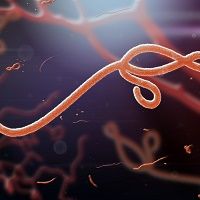Article
Strategy Used for Allergy Medication May Inhibit Ebola
Author(s):
It would be ideal to stop the Ebola virus before it even gets the chance to enter cells; and with a new understanding that may become a reality.

It would be ideal to stop the Ebola virus before it even gets the chance to enter cells; and with a new understanding that may become a reality.
G protein-coupled receptors (GPCRs), a group of cell surface receptors, act as a gateway entry into a cell. GPCRs have already been the target of various therapeutics, such as allergy medicines, in order to prevent diseases from making their way into cells. Lijun Rong, PhD, and colleagues from the University of Illinois (UIC) found that Ebola, and the closely related Marburg virus, use the same gateway to infect cells. Therefore, this may be a beneficial target to inhibit the deadly disease.
“We know very little about the basic biology of these diseases,” Rong, a professor in microbiology and immunology at UIC, said in a news release. “These G protein-coupled receptors are a big family of closely related molecules in humans — altogether, probably more than a thousand.”
To start off, the team developed a human immunodeficiency virus (HIV)-based surrogate entry assay to identify specific entry inhibitors for pathogens. Then they screened the Prestwick Chemical Library, made up of 1,200 approved drugs, for ones that target Marburg virus/HIV. A total of 29 medications, 24 of which were GPCRs, were found to stop more than 80% of the Marburg virus/HIV entries. To determine if the same would happen to prevent Ebola entry, the drugs were tested and all 29 proved successful. The top 20 most potent drugs, 16 of which were GPCR antagonists, blocked more than 80% of the virus. The authors noted that the strategy, however, did not stop HIV entry.
“There are a lot of drugs and compounds that work through this mechanism — acting as antagonists to GPCR receptors. This gives us a huge repertoire that can be tested against Ebola/Marburg,” Rong said.
The findings indicate that GPCR antagonists play a key role in how the Ebola and Marburg viruses infect cells, according to the report published in the Journal of Virology. The GPCR antagonists came from multiple classes including histamine receptors, 5-HT (serotonin) receptors, muscarinic acetylcholine receptor, and adrenergic receptor.
“In the history of therapeutics, about half of our drugs were developed to target GPCRs,” Rong explained. “For example, a number of antihistamines used as allergy medications are GPCR receptor antagonists.”
This information can help researchers go on to develop pharmaceuticals that stop the viruses at the point of entry.




